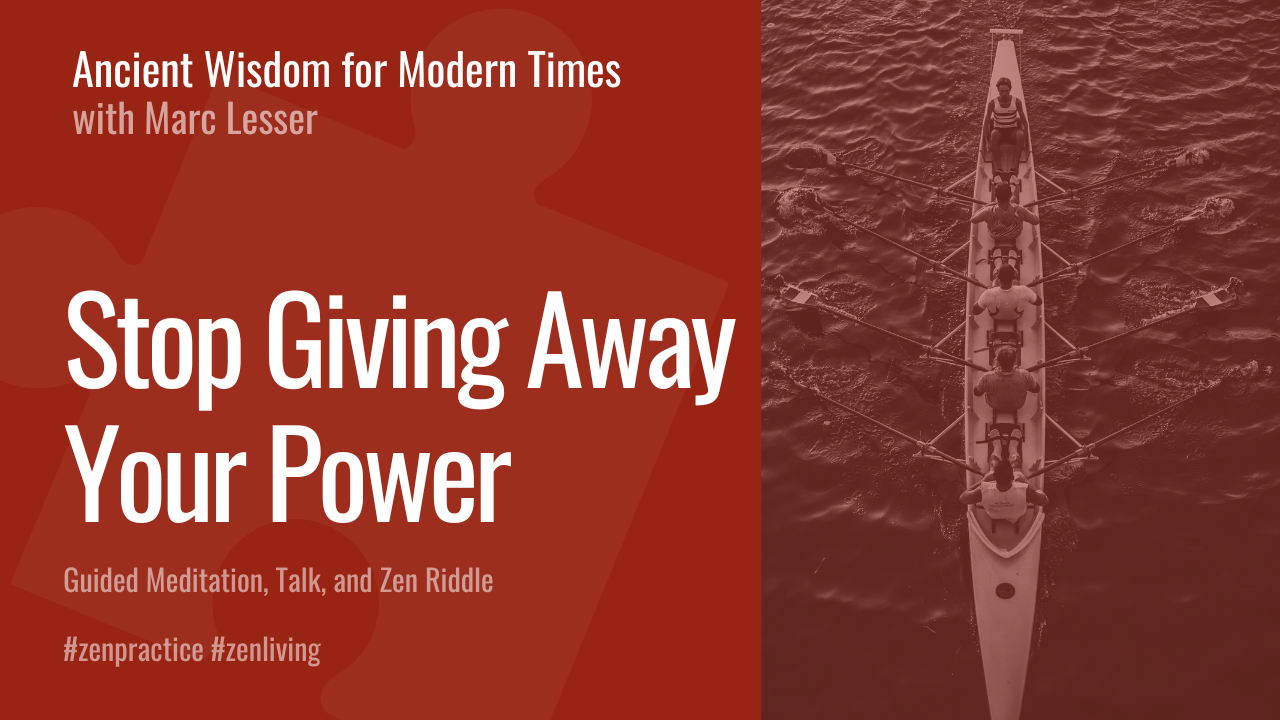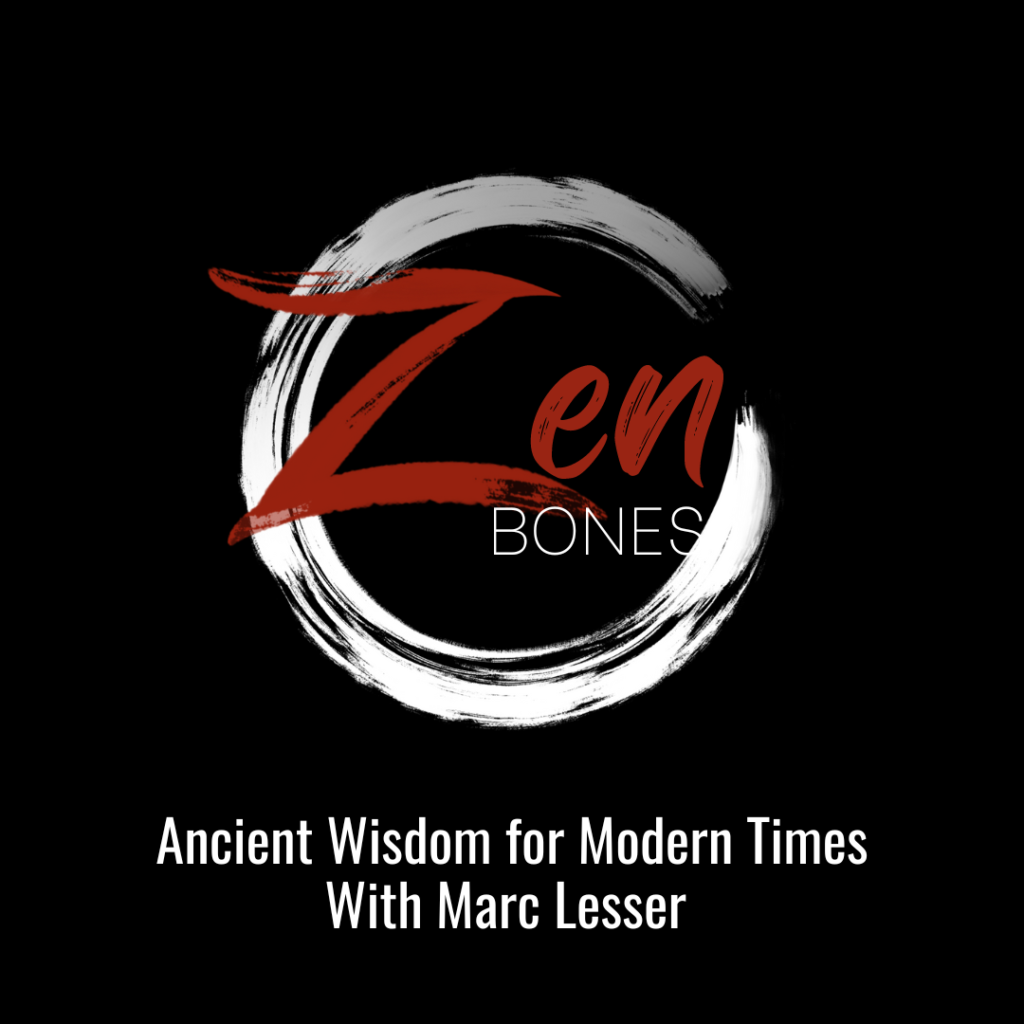In this Practice episode, Marc begins with a short guided meditation on ways to cultivate a sense of awe, wonder, and warmheartedness as the path of finding your authentic power. He then gives a short talk on power as an expression of the heart, of compassion, and as a way of being clear and effective, while also identifying ways that we give our personal power away. Today’s Zen puzzler comes from a famous Zen question: “What is the teaching of a lifetime?”
EPISODE TRANSCRIPT
[music]
Marc Lesser: Welcome to Zen Bones: Ancient Wisdom For Modern Times. This is Marc Lesser. Why Zen Bones? Our world is in crisis and ever shifting. Now more than ever, more wisdom, clarity, and courage are essential, especially in the world of work, business, and leadership. Today’s practice episode is Stop Giving Away Your Power. One of my favorite topics. We begin with a short guided meditation that includes feeling a sense of awe, wonder and warmheartedness as the path to finding your true and authentic power. I then give a short talk about power. Power as an expression of your heart, your compassion as a way of being more clear and more effective as a leader, as a human being.
I describe how to notice the ways that we give it away, that we give our power away as a path to finding your true power. Today’s Zen puzzler comes from a famous Zen story, a question and answer, what is the teaching of a lifetime and appropriate response? Let’s do some sitting practice together and I think I’ll begin by ringing a bell. [bell ringing] This is a different bell. This bell, the sound continues. Can you hear it? [silence] The sound of the bell, that’s simple. It’s a way of reminding us, priming us to stop and be here. No place else but here. So often, we’re so scattered these days.
I think it makes a lot of sense to practice, train ourselves to be present, bringing attention to our bodies. Noticing what it’s like to be in this body that we so easily take for granted. Amazing, amazing. I think we can be filled with awe when we bring attention to our bodies and how much is going on completely outside of our awareness and our control, awe of the…
It’s even hard to find words for the blood coursing through our bodies, the oxygen, all of the amazing billions of synapses in our brain, which fortunately we don’t have to do anything. We do need to, I think, train ourselves to heal, to process all of the challenges and difficulties of what it’s like to be human. The losses, the unknowns, the pain. I think of this practice as keeping our hearts open right in the midst of all of the challenges.
Also related to that, I think finding our real power, finding ways of not giving away our power. Power in the positive sense, positive sense of compassion, presence, effectiveness. Power. Can you feel it right now in your body with your breath? Letting go of the thoughts and stories about scarcity or anything lacking, the to-do lists, and being here. [silence] I can use the breath as a focal point, as an anchor to staying present. Using our thinking minds, our cognitive minds to be curious about what it’s like to be here, to be a sense of wonder. Letting go of the skepticism and, instead, to be curious, bringing a childlike quality to what is this body and what is this breath?
Letting thoughts come and let them go and just being here. Curious, kind, warmhearted. I think there’s tremendous power in warmheartedness, a warmhearted approach to starting with ourselves. Imagine having a warmhearted approach to yourself, to know a gentle firm acceptance. Openness and nothing to fear, nothing to hide, and keeping it simple by just practicing with sitting here with an open heart and an open mind as much as possible, whether you’re feeling calm, or not so calm, or joy, or grieving. It’s all okay. No need to change anything. Appreciating everything. I think this is part of the path of not giving away power, but instead to find our true power. [silence] Please feel free to continue sitting or come and transition with me.
[music]
This topic of power is one that has been important to me, essential to me for a long time. It actually started with when I was in my early 20s living at Green Gulch Farm, part of the San Francisco Zen Center. A woman teacher of mine looked me in the eyes and said, “Marc, you have a way of pissing away your power.” I was aware enough to know that this was not a compliment. At the same time, over my lifetime I come back to this statement by this woman Zen teacher as a great gift and makes me think about what power did she see in me that I didn’t see in myself, as well as what is power and how was I giving it away. Here, I’m talking about power in a positive sense. I think about power as our ability to be clear, our ability to be present, our ability to make effective decisions, our ability to influence in a positive way to help for the greater good. I think that developing our sense of agency and our personal power may be one of the most important practices that we can engage in as a way of living, as a way of leading, as a way of helping do things more skillfully to maintain a healthy work-life balance, to foster more effective communication, and as a way of nurturing our most important key relationships. I think underneath that and holding this is our own sense of real power, authentic power.
Recognizing the importance of agency in this context is easy, but have you ever thought about some of the ways that you might be giving away, whittling away your innate power? I think considering the ways in which we give away our power can actually be strangely empowering, right? Another interesting paradox, and can also bring out and expose some useful insights, some useful lessons. A question that I’ve asked many individuals in a variety of contexts and settings is, how do you give away your power? How do you give away your power? Some of the answers that I hear most commonly are things like, “I say yes when I mean no.” “I rush from one thing to another, totally caught up in the busyness.”
I hear people say, “I overthink decisions and then I overthink my overthinking.” Another common answer is, “I underestimate my abilities. I underestimate my abilities, I doubt myself, I let fear and anxiety get in the way of my true power.” Another common answer is, “I don’t make clear requests and I don’t ask for help often enough.” I think that asking ourselves this question and naming our own tendencies about how we give away our personal power can heighten our awareness. It’s a way of shining the light on and noticing our patterns, our actions, and how we can step into or not step into our own sense of personal agency and responsibility.
I think this is a powerful mindfulness practice, and in a way, a core practice and perhaps starting point of mindful leadership as leaders, and I think we’re all leaders. We can practice having more power and more agency by not avoiding conflict, by being more real, more vulnerable, courageous, being willing to take a stance especially when it feels risky or challenging. We can bring more awareness to our tendency to be overly busy as a way of, we can see that busyness can often be a way of avoiding conflict, avoiding stress and anxiety. If we notice this pattern, we can find a way of practicing more spaciousness, we can notice our process of decision making.
Sometimes it’s better to ask for forgiveness rather than for permission, right? That we can make decisions more easily, less overthinking, less caution when appropriate. We can be more realistic about our own competence, exploring how we can transform our doubts into more possibility. Bringing an attitude of greater curiosity to everything that we do and everything that we’re engaging in, and we can depend more on others by making clear requests. Again, these are all ways I think of that we can stop giving away our power and where we can find our own, again, genuine positive power.
I think in some ways, we’re all searching for ways to find our true power. I think this is a way to describe mindfulness practice, human practice, in our families, our relationships, our work, our identities, all parts of our lives. Our true power lies in how we step into our full authentic selves and how we can have a positive influence on all of those that we touch. To just read a couple of short poems about power by Emily Dickinson, where she says, “To be alive is Power, existence in itself without a further function, Omnipotence Enough.” “I took my Power in my Hand and went against the World. ‘Twas not so much as David had but I was twice as bold.” “To be alive is Power, existence in itself without a further function, Omnipotence Enough.”
I think this not giving away your power is a great, important practice, noticing. In this question, I think, how do I give away my power, is very empowering, is very empowering, so please do step into and have the awareness, courage, curiosity, boldness to find your true power.
[music]
Welcome to the Zen Bones puzzler where I will regularly be presenting a story or a Zen koan, or a poem, something to contemplate, to think about, a story that has purpose. It’s about developing greater insight and reflection, not so much for a solution, but as a way to support your practice, a kind of meditation in daily life.
Today’s Zen puzzler, I love these Zen– taking these Zen koans, Zen teachings and looking at how we can make them practical and mysterious, usable ways to just to deepen and broaden our questions and answers, our lives, our relationships. Today’s Zen puzzler comes from a famous Zen koan from a collection. I think from the sixth century China, and it is a question and answer many of these traditional koans, these traditional Zen teachings are questions and answers. This one begins with a question, and the question is, what is the teaching of a lifetime? What is the teaching of a lifetime?
The answer here is rather simple and yet deep and surprising. The answer in this Zen koan collection is an appropriate response, an appropriate response. Sometimes the question is translated as what is the teaching of a thousand lifetimes, right? It’s made a little bit more dramatic. What is the teaching of a thousand lifetimes? An appropriate response. I think these teachings are meant to be thought about, reflected about, brought into your daily meditation and into your daily life. What is an appropriate response? In every moment of our lives, we are responding. We are responding to other people, we’re responding to whatever is being asked of us in every situation.
To me, again, I don’t have the answer here. I think the answer lies within you. My suggestion is for you to turn this. What does this mean? What does this mean for you? To think of this, let this come up in your meditation. Maybe write it down, make a note on your desk that says an appropriate response and come back to it. Write in your journal about it. What does it mean for you to respond appropriately? Are you responding appropriately in your life right now? How might you respond even more appropriately?
For me, I think this word that’s translated as appropriate, I think means with power, with your true authentic power, with compassion, with kindness, with effectiveness, with clarity. Zen practice and all of these Zen koans, Zen puzzlers are extremely aspirational. I think aspirational and impossible. I think we humans in our human lives are aspirational, right? We’re reaching for something. We’re reaching for being our best selves. We’re reaching for solving real problems of the world. We’re reaching to make real connections.
Yes, that’s what this means for me, that it’s mysterious, unknown, and the desire to be of benefit. To be of benefit, to be of use, to transform myself and to transform the world. I hope you’ll practice today. Maybe this week with what is the teaching of a lifetime? What is the teaching of a thousand lifetimes? An appropriate response. Thank you.
[music]
Listen in each week for interviews, teachings, and guided meditations. You’ll receive supportive tools for creating more meaningful work and mindfulness practices to develop yourself, to influence your organization, and to help change the world. Thank you for listening.
[music]
[00:22:48] [END OF AUDIO]









